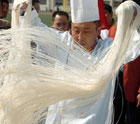A top Three Gorges project planner yesterday refuted media reports that the ecology in the dam area has been damaged, stressing that environmental protection has always been a priority.
"The ecological system in the dam area is actually better than expected," said Li Yong'an, deputy director of the Three Gorges Construction Committee.
With the central government putting ecological protection high on its agenda, Li said an original plan to build 16 hydropower stations on the upper reaches of the Yangtze River will be reconsidered. But he declined to say how many stations will finally be built.
As for the widely-reported landslides at the Three Gorges area, Li said they were common even before the project began.
"But there has never been a landslide on the project section of the river thanks to strengthening of the banks," Li told reporters on the sidelines of the 17th National Congress of the Communist Party of China.
"While environmental impact is inevitable, we should recognize that the project has brought more ecological benefit than harm," Li said, adding that he was surprised to read reports about "played-up" hidden ecological dangers last month.
More than 1 million yuan ($133,000) has been spent on curbing landslides along the bank areas since 2003, and more will be spent with the water level expected to be raised from the current 156 meters to 175 meters next summer, he said.
Li, also general manager of the China Yangtze River Three Gorges Project Development Corporation, noted that the water quality in the gorges has been maintained at drinking standard since the Three Gorges Dam began holding water in 2003.
The government plans to spend 40 billion yuan ($5.33 billion) between 2001 and 2010 to build at least 150 sewage treatment plants and 170 urban garbage disposal centers to prevent water pollution in the dam area and the upper reaches of the Yangtze River.
On resident relocation, Li said more than 1.2 million people, or 85 percent of those covered by the plan, have been resettled.
But due to lack of arable land and jobs, the unemployment rate among the displaced people reached a record 12 percent last year.
Efforts are being made to create more jobs and provide training programs for the resettled population, said Wang.
(China Daily 10/19/2007 page1)











